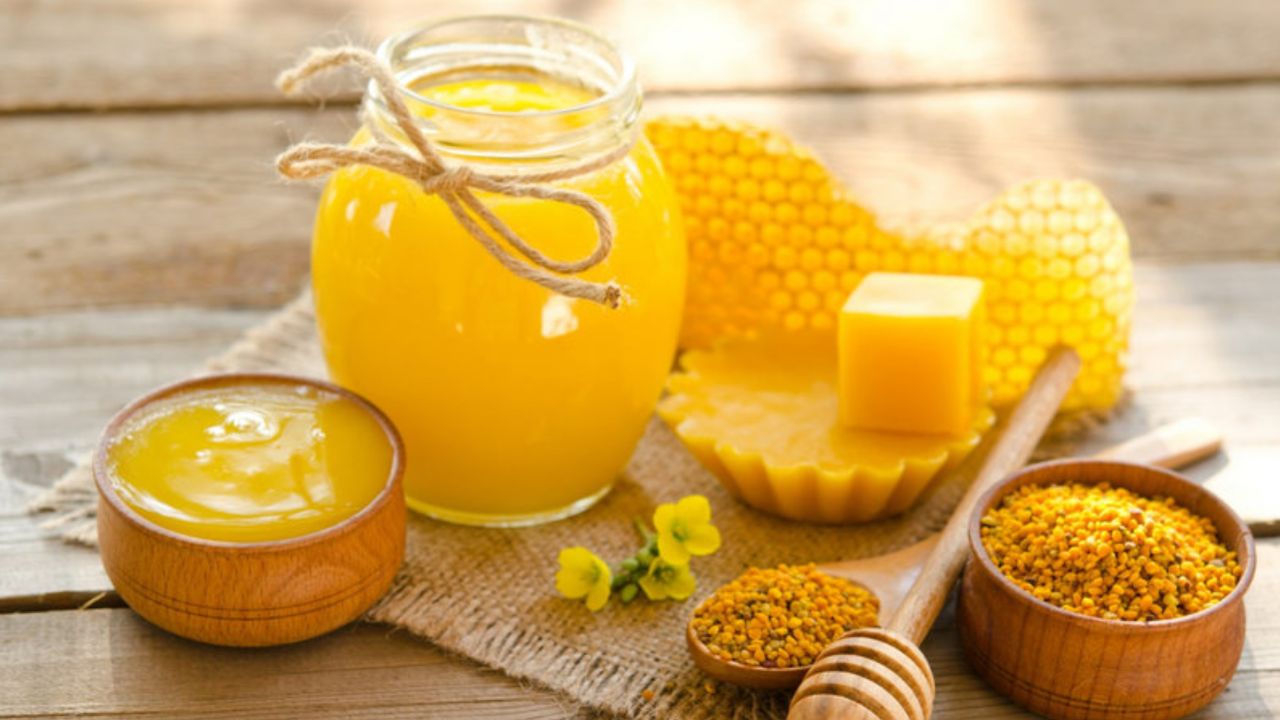Propolis: A Natural Remedy with Incredible Uses and Benefits
While some people may be familiar with bee propolis, over 60% of people have never heard of it. Propolis is a waxy substance produced by bees, made from a mix of pine resin, other tree resins, wax, and pollen. Bees use it to seal cracks and gaps in the hive and to build new honeycomb panels.

The word “propolis” comes from a Greek term meaning “defense of the city,” reflecting its primary role in safeguarding the hive from external threats. Propolis is not only used by bees to protect their hive but also serves as a protective barrier against toxins, bacteria, fungi, and harmful invaders like snakes, lizards, and mice.
Its antimicrobial and antifungal properties help maintain the hive’s health and cleanliness, ensuring that it remains a safe environment for the colony. For centuries, propolis has been used in traditional medicine to treat abscesses, fight infections, and heal wounds.
Ancient civilizations, including the Egyptians and Greeks, valued propolis for its medicinal properties. In fact, propolis was even used in the mummification process, highlighting its historical importance. Today, numerous scientific studies have revealed a wide range of health benefits associated with propolis.
These benefits include its potential to support immune health, treat various infections, and improve skin conditions. Propolis is also gaining recognition for its potential anti-cancer effects, making it a valuable natural remedy for a variety of health concerns.
As more research is conducted, the full therapeutic potential of propolis continues to be explored, further establishing it as a potent and versatile natural substance.
What Is Bee Propolis?
Bee propolis is a resinous mixture produced by honeybees. They combine their saliva and beeswax with substances gathered from tree buds, sap flows, and other botanical sources. The color of propolis can vary, depending on the materials the bees collect, but it typically ranges from light to dark brown.
The Role of Propolis in the Hive
Propolis plays a crucial role in maintaining the integrity of the hive. Bees use it to seal small cracks and gaps in the hive, while larger openings are filled with beeswax. This is vital for the protection of the hive, as unsealed gaps could allow dangerous invaders, such as snakes and lizards, to enter.
Chemical Composition of Propolis
Propolis is a complex substance, containing over 300 natural compounds. These include amino acids, coumarins, phenolic aldehydes, polyphenols, sesquiterpene quinones, and steroids. In its raw form, propolis typically consists of:
- 50% resins
- 30% waxes
- 10% essential oils
- 5% pollen
- 5% various organic compounds
The composition of propolis can fluctuate depending on the time of collection, geographic location, and the specific plant sources the bees access.
Historical Significance and Modern Use
Although bee propolis may seem like a modern health trend, its use dates back to ancient times. Historical records indicate that Aristotle (circa 350 B.C.) referred to propolis, and the substance was also employed in the mummification process by the ancient Egyptians.
The Greeks and Assyrians prized propolis for its medicinal properties, particularly for its ability to heal wounds and treat tumors. Today, scientific research and anecdotal evidence continue to support propolis as a powerful and medicinal substance. The following section explores some of the specific health benefits of propolis.
Top 10 Health Benefits of Bee Propolis
Bee propolis, a resinous substance produced by honeybees, has been used for centuries due to its impressive medicinal properties. Packed with antioxidants, antimicrobial compounds, and other bioactive substances, it offers numerous health benefits. Here are the top 10 health benefits of bee propolis:
1. Boosts Immune System Function
Propolis is known to stimulate the immune system, enhancing the body’s natural defense against infections. Its antimicrobial and antioxidant properties help the body fight off bacteria, viruses, and fungi, promoting overall health and immunity.
2. Helps Combat Cancer
Propolis has been found to have anti-cancer and anti-tumor properties. Studies show that compounds in propolis can inhibit DNA synthesis in cancer cells and promote apoptosis (programmed cell death). It is particularly noted for its effects in preventing the development of certain types of cancer, including skin, breast, and liver cancer.
3. Treats Candida Infections
Propolis has strong antifungal properties, making it effective in treating Candida infections, which can affect the mouth, intestines, and other parts of the body. It inhibits the growth of Candida albicans, providing relief from oral thrush, vaginal infections, and other fungal issues.
4. Promotes Wound Healing
Propolis has been used for centuries in traditional medicine to heal wounds. Its antimicrobial, anti-inflammatory, and antioxidant properties help speed up the healing process of cuts, burns, and other skin injuries, reducing the risk of infection and promoting tissue regeneration.
5. Supports Oral Health
Propolis is often used in oral care products due to its ability to fight bacteria and prevent gum disease. It helps reduce plaque formation, prevent cavities, and fight oral infections like gingivitis and periodontal disease. Propolis also soothes sore throats and reduces inflammation in the mouth.
6. Reduces Inflammation
Propolis contains compounds that help reduce inflammation in the body, making it beneficial for conditions like arthritis and inflammatory diseases. Its anti-inflammatory effects help relieve pain and swelling, promoting better joint health and overall well-being.
7. Acts as an Antioxidant
Propolis is rich in antioxidants, which help protect the body from oxidative stress and free radical damage. These antioxidants neutralize harmful molecules that can lead to chronic diseases, aging, and tissue damage, supporting long-term health and vitality.
8. Supports Skin Health
The antioxidants and anti-inflammatory properties of propolis make it a great addition to skincare routines. It helps reduce acne, eczema, and other skin conditions by fighting bacteria and soothing irritated skin. Propolis is also used in creams and lotions to promote healthy, youthful skin.
9. Helps with Respiratory Health
Propolis has natural antiviral and antimicrobial properties that can aid in treating respiratory conditions. It can help relieve symptoms of colds, coughs, bronchitis, and asthma by reducing inflammation and fighting off infections in the respiratory tract.
10. Improves Digestive Health
Propolis supports digestive health by helping to maintain a healthy balance of gut bacteria. It has been shown to reduce symptoms of inflammatory bowel disease (IBD), including Crohn’s disease and ulcerative colitis, and can aid in the healing of ulcers in the digestive tract.
How to Use Bee Propolis
Bee propolis is available in various forms, including extracts, tinctures, capsules, tablets, powders, sprays, ointments, and creams. You can typically find these products at health food stores or online.
Depending on your health needs, there are different ways to use bee propolis:
- Internal Use: If you’re taking bee propolis internally, options include liquid extracts, capsules, tablets, or powders. The general recommended dose for internal use is typically 500 milligrams once or twice daily. It is best to take propolis with food to help absorption and minimize any stomach irritation.
- External/Topical Use: For topical applications, such as treating skin issues or sore throats, you can use propolis ointments, creams, or sprays. Always follow the label instructions when using these products, and be mindful of any potential allergic reactions on sensitive skin.
Here are some specific and studied ways to use bee propolis for various health concerns:
1. Common Cold and Sore Throat
- Internal: 500 milligrams, one to two times per day. Propolis can help reduce inflammation and fight infections, providing relief from throat discomfort.
2. Cold Sores
- Topical: Apply propolis ointment directly to the cold sore four times per day. It helps reduce the size and pain of the cold sore, promoting faster healing.
3. Genital Herpes
- Topical: Apply a 3% propolis ointment to the affected areas four times per day. Propolis may help reduce itching and inflammation while speeding up recovery from the lesions.
4. Female Infertility and Endometriosis
- Internal: 500 milligrams, two times per day. Propolis has been shown to support hormone balance, which can be beneficial for women experiencing infertility or endometriosis.
5. Yeast Infection
- Topical: Apply an alcohol extract containing 2 grams per 25 milliliters four times per day. Propolis’ antifungal properties can help eliminate the infection and restore balance in the affected area.
6. Rheumatoid Arthritis
- Topical: Apply according to package directions. Propolis may help alleviate inflammation and pain associated with arthritis, improving joint function over time.
7. Parasites
- Consult a qualified healthcare practitioner for product recommendations and proper dosing. Propolis may have antiparasitic effects, but specific dosages and products should be tailored by a professional.
When using propolis, it’s important to follow dosage recommendations and consult with a healthcare provider if you are unsure about the appropriate form or dosage for your specific health concern.
Risks and Side Effects
While bee propolis offers numerous health benefits, there are some risks and side effects to be aware of:
- Allergic Reactions: People who are allergic to honey, bee pollen, royal jelly, or conifer or poplar trees should avoid using propolis unless tested first by an allergy specialist. Allergic reactions can include skin irritation, swelling, or respiratory problems.
- Bleeding Risk: Propolis may increase the risk of bleeding in individuals who take blood-thinning medications or who have bleeding disorders. Since propolis can slow blood clotting, it is advised to stop using it at least two weeks before any scheduled surgery to minimize this risk.
- Parasitic Infections: For parasitic infections like giardiasis, propolis should not be used as the sole treatment without consulting a physician. It may have some therapeutic effects, but professional medical guidance is necessary.
- Asthma: Individuals with asthma should be cautious with propolis. Some chemicals in propolis may potentially worsen asthma symptoms, although research has also shown positive effects for some asthmatic patients. It’s crucial to speak with your doctor before using propolis if you have asthma.
- Pregnancy and Breastfeeding: Pregnant or breastfeeding women should consult their healthcare provider before using propolis to ensure safety for both mother and child.
- Medication Interactions: If you are on any medications or have ongoing health concerns, it’s important to consult with your doctor before using propolis. It may interact with certain medications, so medical supervision is recommended.
FAQ’s
1. What is bee propolis used for?
Bee propolis is used for its antimicrobial, anti-inflammatory, and healing properties. It is commonly used in natural medicine to support the immune system, treat wounds, sore throats, and support skin health.
2. What are the benefits of propolis?
Propolis has a wide range of benefits, including boosting immunity, fighting infections, supporting skin health, promoting wound healing, and acting as an antioxidant. It’s also used for respiratory health, dental hygiene, and as an antimicrobial agent.
3. Who should avoid bee propolis?
People who are allergic to bee products (such as honey or bee stings) should avoid bee propolis. Individuals with certain autoimmune conditions or those who are pregnant or breastfeeding should consult a healthcare provider before using it.
4. Is bee propolis good for skin?
Yes, bee propolis is good for the skin. It has natural antibacterial and anti-inflammatory properties that can help treat acne, wounds, and skin irritations. It’s also known to promote skin healing and regeneration.
5. Can I use propolis every day?
Yes, propolis can be used daily, but it’s important to start with small amounts to ensure you don’t have any allergic reactions. If you have sensitive skin or allergies, it’s best to consult with a healthcare professional.
6. Is propolis good for hair?
Propolis is sometimes used in hair care products due to its antibacterial properties and its ability to stimulate hair growth and promote a healthy scalp. It can help treat dandruff and other scalp conditions.
7. Is propolis better than honey?
While both honey and propolis offer health benefits, they serve different purposes. Honey is a natural sweetener with its own antimicrobial properties, while propolis is used more for its immune-boosting, anti-inflammatory, and healing properties. Propolis is not necessarily “better” than honey but has unique benefits.
8. Can propolis cure a cough?
Propolis may help soothe a sore throat and reduce inflammation, which can alleviate some symptoms of a cough. However, it is not a cure for a cough. It’s often used in conjunction with other treatments for relief.
9. Is propolis good for the kidneys?
Some studies suggest that propolis may have protective effects on the kidneys due to its antioxidant and anti-inflammatory properties, but more research is needed to confirm its specific benefits for kidney health.
10. Is bee propolis an antibiotic?
Yes, bee propolis has natural antibiotic properties. It has been shown to inhibit the growth of various bacteria, viruses, and fungi, making it useful in fighting infections.
11. Is propolis good for the liver?
Some research suggests that propolis may support liver health by acting as an antioxidant and anti-inflammatory agent, helping to protect the liver from damage.
12. What is the real work of bees?
Bees play a crucial role in pollination, which helps plants reproduce. This process is vital for the production of many fruits, vegetables, and seeds. Bees also contribute to the production of honey, wax, and propolis, which have various uses for both the hive and humans.
Bee propolis is a powerful natural substance with a wide range of health benefits, including boosting immunity, promoting skin health, and offering antibacterial and anti-inflammatory properties. It has been used for centuries in traditional medicine to treat a variety of ailments, from sore throats to wound healing.
References
- Evidence on the Health Benefits of Supplemental Propolis(1)
- Biological Properties and Therapeutic Applications of Propolis(2)
- The use of propolis in dentistry, oral health, and medicine: A review(3)
- Anticancer Activity of Propolis and Its Compounds(4)
- An Overview of the Evidence and Mechanism of Drug–Herb Interactions Between Propolis and Pharmaceutical Drugs(5)
- Propolis: Its Role and Efficacy in Human Health and Diseases(6)























